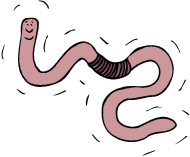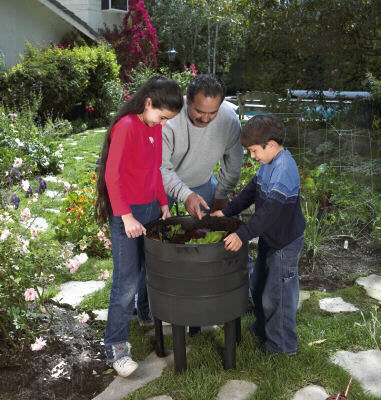Vermicomposting for Your Garden
 If you’re looking for a way to inexpensively fertilize your garden, there is no better way than vermiculture! Using leftover kitchen scraps and a bit of know-how, you can really hit pay dirt.
If you’re looking for a way to inexpensively fertilize your garden, there is no better way than vermiculture! Using leftover kitchen scraps and a bit of know-how, you can really hit pay dirt.
Worm composting requires a few basic items: redworms, a worm bin, bedding for the bin, and food scraps. It is important that redworms, also known as Red Wrigglers, are used and not common earthworms from the garden. This is because redworms are built to feed on organic materials while earthworms are more suited to digest material that is already beginning to decompose and consequently would not survive long in the bin. Composting worms prefer cool, moist and dark locations; try to maintain the bin between 40°F and 80°F for best results. A worm bin can easily be stored in your kitchen, on your porch, or in your greenhouse.
It is unlikely that you can feed your red worms too much waste because they can compost up to half their own weight each day. That’s one-half of a pound of scraps for every pound of worms! Also, as long as they have enough food, they will reproduce quite quickly. Redworms are hermaphroditic and they can 
The bedding that you place in your worm bin will become both their home and part of their diet. Composting without a bedding source can cause some pretty bad odors, and your bin will become quite a slimy mess. The best things to use would be leaves or grass clipping, shredded newspaper (no glossy pages!), or coir. Be sure to keep the bedding at a comfortably moist level. Worms are mostly water, and if not kept moist enough, they will dry out and die. Certain inks or dyes in the shredded newspaper might cause the worm bin to become too acidic, so using a small amount of pulverized limestone or dried eggshells can be used to keep pH levels in check.
Feed your worms by burying food scraps in holes dug into the bedding. Always cover the food with a few inches of the bedding or the castings in the bin in order to prevent fly infestation and odor. Consider your worms as vegetarians; giving them dairy, meat, seafood or oily foods is possible, but it will cause your worm bin to become invaded with pests and stench. The best foods to use include raw fruit and vegetable scraps, grains, or tea bags. Avoid using foods that are too acidic, such as citrus fruit.
Vermicompost provides nutrients to your plants and helps the soil retain its moisture. You can use it immediately or store it for later use. The compost can be mixed with your potting soil as a soil amendment or used as a top dressing. You can use worm castings directly on your plants since it is a ‘cool’ manure and won’t burn seedlings. It can also be used to make compost ‘tea’, by adding 1-2” of compost to your water or into your rain barrel and allowing it to steep for a day.






